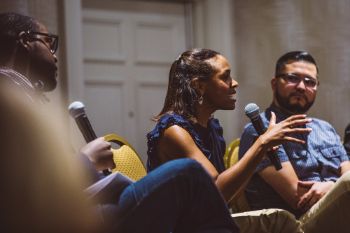
Trillia Newbell, the ERLC�s director of community outreach, speaks as a panelist during a breakout session on race and cultural engagement Aug. 26 at the ERLC National Conference. Photo by Rocket Republic
NASHVILLE—Speakers at a Southern Baptist-sponsored conference on cultural engagement provided guidance on how the gospel of Jesus addresses issues from race relations to politics to the arts.
The Ethics & Religious Liberty Commission’s 2016 national conference attracted more than 900 attendees for two days of considering how Christians can engage the culture while remaining faithful to the gospel.
ERLC President Russell Moore said he wants attendees to approach culture with confidence in the gospel’s proclamation, as well as with kindness and gentleness.
Fear among American Christians is “a very real problem,” and those fears sometimes “actually contradict the gospel itself,” Moore said.
Hip-hop artist and pastor Trip Lee told the audience engaging culture does not require “some grand scheme.”
“If you want to engage culture, be faithful in public,” he said. “When I say in public, I mean in our daily lives in front of other people.”
To engage culture, Christians don’t need “a massive understanding of culture,” Lee said. “You’ve just got to follow Jesus in public.”
“Hip-hop is not exactly known for its moral uprightness and robust theology,” he said. “As a rapper then, I get the opportunity to try to show off Jesus when it’s not expected. Any time you see faithfulness to Jesus, it feels unexpected and refreshing.”
Minority pastors Bryan Loritts and D.A. Horton urged evangelicals to embrace gospel-based racial reconciliation.
“(E)vangelical passivity when it comes to matters of race” is prevalent, and it exists among minority as well as white Christians, said Loritts, lead pastor of Abundant Life Christian Fellowship in California’s Silicon Valley.
“We’re different, and those differences are not to be ignored. Nor are they to be idolized,” he said.
“If the gospel does not come to bear on your social relationships, you have not truly embraced the gospel,” Loritts said.
Horton, pastor of Reach Fellowship in Los Angeles County, said of race relations in America, “I see tension. I see conflict. I’m not seeing resolution.”
While the church is positionally a “snapshot of heaven,” practical segregation is still being practiced, he told attendees.
“(M)any of our conversations about multi-ethnic issues are not multi-ethnic themselves because we lack multi-ethnic leadership. … It’s one thing to have a multi-ethnic church, it’s another thing to have multi-ethnic leadership,” Horton said.
He urged both white and black evangelicals not to abandon each other when conflict arises. “Conflict is nothing more than the litmus test of our relationships.”
Panelists discussing evangelical political engagement agreed the recent cultural upheaval and the disconcerting presidential election campaign is not without some positive effects.
“This election cycle has been a nearly unmitigated disaster,” said Bruce Ashford, provost and professor of theology and culture at Southeastern Baptist Theological Seminary. “I say ‘nearly unmitigated’ because I think that it has taken something of this magnitude maybe to awaken many or most of us to the fact that we should not be beholden to any narrative, not the Fox News narrative or the MSNBC narrative � or any modern political ideology.
“As I see it, every modern political ideology has idols lurking underneath it,” he told attendees. “And I think this election has been unsettling enough that we might once again realize the gospel transcends and calls into question all of those things, and we might regain our witness and the clarity of our voice.”
In a conversation on preaching and engaging culture, Moore and mega-church pastor Andy Stanley demonstrated divergent approaches to sermons.
Stanley, senior pastor of North Point Ministries in Atlanta, said he thinks of a sermon series as a 3 1/2–hour sermon that he stretches across six weeks. He may not even have a biblical text during the first Sunday or two.
He does not lack confidence in biblical authority, but he takes this approach with non-Christians attending his church’s gathering “based on culture and some cultural assumptions,” Stanley said. To remove obstacles, he does not say, “The Bible says,” but refers to the authors and Jesus, attempting to “weave every single sermon” back to Christ and His resurrection, he said.
Stanley told Moore he has never preached a sermon on abortion, believing it is better to address the issue and those involved in a small group setting.
Moore responded by saying it is important that what we “are approaching people with is an encounter with the risen Christ who speaks through His Word.”
“In a worship experience, what you are doing is communicating to your people, I think, and to the people who are watching what is the basis for our authority as a congregation and as a church,” he told Stanley.
One of the reasons he preaches about abortion, Moore said, is to offer “mercy and reconciliation” to those who have participated in an abortion.
Jimmy Scroggins—lead pastor of the multi-generational, multi-ethnic Family Church in West Palm Beach, Fla.—said as part of a panel on pastoral ministry he thinks about cultural engagement “every single day.”
“Honestly, I don’t see how you can possibly be pastoring in today’s environment without thinking about it every single time,” he said. (BP)
Tom Strode